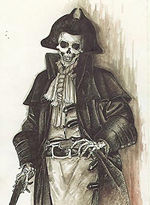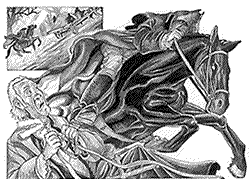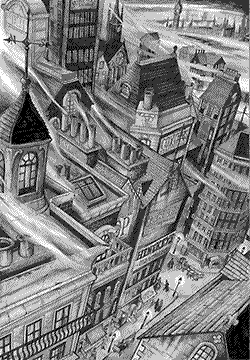>> The Friday Review: The Birthday Riots
>> The Friday Review: A Distant Soil: The Gathering
More...

Name the three most common comic genres. The odds are the genres you thought of were 'superhero','horror' and 'science fiction'. There might have been a couple of others in there, but those three are the most commonly occurring.
What you almost certainly did not say is supernatural historical drama. Which is why David Hitchcock's work, the graphic novel SPIRIT OF THE HIGHWAYMAN, stands out from the crowd. Hitchcock's work is firmly rooted in both national history and national myth. After all, where else would you find a supernatural caper story, somewhere between PLUNKETT AND MACLEANE and every Errol Flynn movie ever made? Now, with his Jack the Ripper one shot WHITECHAPEL FREAK just out, Hitchcock is about to make his presence felt, at long last, on the industry.
However like many others, Hitchcock's start in the industry was on a much smaller scale. "My first break into comics came about ten years ago in a short-lived horror mag called Skeleton Crew - anybody remember that one? I drew a short vampire story, and after that the magazine folded! Nothing to do with me though...honest guv'nor."
 WIth SKELETON CREW no longer an option, Hitchcock pressed on on his own, attempting to crack the industry through the familiar route of cold calling, portfolios and submission guidelines. However, after dealing with a seemingly endless procession of slammed doors, he tried a different tack. "I decided to go it alone after the endless 'knock backs' over the years. I felt that the people at the top couldn't really give a monkey's about us 'portfolio-peddlers', and after a while I thought the only way to get anywhere in this industry is to publish my own stuff and hopefully use it as a stepping-stone to other work."
WIth SKELETON CREW no longer an option, Hitchcock pressed on on his own, attempting to crack the industry through the familiar route of cold calling, portfolios and submission guidelines. However, after dealing with a seemingly endless procession of slammed doors, he tried a different tack. "I decided to go it alone after the endless 'knock backs' over the years. I felt that the people at the top couldn't really give a monkey's about us 'portfolio-peddlers', and after a while I thought the only way to get anywhere in this industry is to publish my own stuff and hopefully use it as a stepping-stone to other work."
This willingness to self publish places Hitchcock in a similar position to ASTRONAUTS IN TROUBLE creator Larry Young. Both men have circumvented the system to make themselves known and both have met with a great deal of success doing so. However, it's a far from easy path to take, as Hitchcock is quick to point out. "[It's] bloody hard! I only started out to concentrate on the art side, but as you progress with the story, ideas tend to form themselves. Certain parts of a story will link to others and before you know it you have a beginning, a middle and an ending. As far as being my own publisher goes - I'd be quite happy for someone else to deal with that side of things!"
Despite these difficulties, Hitchcock has succeeded in placing his work in the public eye and has been rewarded with praise from the likes of Alex Ross, who hailed both his storytelling and line work as particularly impressive. While this has raised his visibility within the industry, Hitchcock's work truly stands out in its subject matter, historical fiction: "Black Boar Press was created as a vehicle to put out the type of stories that are overlooked in today's comics market. Stories I know readers will like, simply because they are not generally covered. My first graphic novel was about a 'spooky highway robber' for God's sake! I picked this era as a starting point because it was visually rich in detail, and I thought it would be fun to draw. Also, I didn't need to draw any cars! "
 By tackling this different subject matter Hitchcock has both raised his own profile and proved just how versatile a medium comic can be. His is a comics industry that isn't mired in '60s cold war paranoia, or inhabited by square-jawed Americans in tight-fitting bodysuits. However, when asked why almost all the big publishers are best known for exactly this, his views are succinct. "I think most publishers tend to stick to formulas that have a proven track record, genres that they know will sell well."
By tackling this different subject matter Hitchcock has both raised his own profile and proved just how versatile a medium comic can be. His is a comics industry that isn't mired in '60s cold war paranoia, or inhabited by square-jawed Americans in tight-fitting bodysuits. However, when asked why almost all the big publishers are best known for exactly this, his views are succinct. "I think most publishers tend to stick to formulas that have a proven track record, genres that they know will sell well."
It's ironic then that the most successful piece of historical graphic fiction produced to date is Alan Moore's FROM HELL, a book that WHITECHAPEL will inevitably be compared to. However, Hitchcock's approach to the subject matter is notably different, and rather more by accident than design. "WHITECHAPEL FREAK came about through pure chance. A publisher asked me if I fancied doing a short Jack the Ripper tale for him, after doing about four pages of work nothing came of it. I left it lying around upstairs to gather dust, I went back to it sometime later, and I thought 'I'll do something with this!' My take on the Ripper mythos is totally different from FROM HELL, in as much as I can't write nearly as well as Alan Moore's right toe! Seriously though, my tale revolves around the true facts - murders, locations etc. - but it puts a new spin on things when the rest of the cast - a travelling freakshow - rolls into town.
The other unusual touch to Hitchcock's work is its format. In a medium mired in 22-page "pamphlets" and uniformly sized graphic novels, Hitchcock is constantly experimenting with formats for his work. "SPIRIT OF THE HIGHWAYMAN was produced as an oversize graphic novel, as I thought that would be the best way to get to the US market. WHITECHAPEL FREAK is being produced on high quality newsprint, tabloid format to mirror an 'illustrated newspaper' circa 1888. I'm hoping that this unusual approach will be beneficial to the sales. This will also enable me to sell the product cheaply too!"
 This second project also brings to light Hitchcock's fascination with England, and the narrative possibilities it offers. However, this is less a conscious choice and more a natural fascination with England's history. "I think all the projects I have worked on so far have been subconsciously British in origin, I didn't start out with the intention of flying the Union Jack. Though I believe there's a lot to be said for our green and pleasant land, in terms of legendary tales, folklore and the amount of great comic creators we have!
This second project also brings to light Hitchcock's fascination with England, and the narrative possibilities it offers. However, this is less a conscious choice and more a natural fascination with England's history. "I think all the projects I have worked on so far have been subconsciously British in origin, I didn't start out with the intention of flying the Union Jack. Though I believe there's a lot to be said for our green and pleasant land, in terms of legendary tales, folklore and the amount of great comic creators we have!
This interest in the English comics community is reflected in Hitchcock's own tastes. "I don't really have any influences as such, not that I would notice in my work at any rate. I like Jack Kirby, Simon Bisley, Steve Rude, Dan Bereton and zillions more. That's really my main reason for buying comics. Grant Morrison, Alan Moore, Neil Gaiman. If I could write like any of those guys I wouldn't spend all my time drawing pictures!"
And yet, despite his fascination with English stories, the period Hitchcock would most like to work in is actually "overseas". "I fancy doing a mobster type thing set in 1930s New York. But there would have to be a ghost in there somewhere ... Oh, and not too many automobiles!"
As for his own feelings on his work, Hitchcock is most pleased with the latest material. "I'm really proud of WHITECHAPEL FREAK, in the fact that it's all my own work. And if it gets optioned for a film I won't have to share the money with anyone else! I had some help 'fleshing-out' SPIRIT OF THE HIGHWAYMAN, at that point in the proceedings I really didn't want to do all the writing as well as 100 pages of art."
Finally, his plans for the future are refreshingly simple. "WHITECHAPEL FREAK II. Hehe...there are a few loose ends."
The freaks will be stalking London for a little while yet. And David Hitchcock wouldn't have it any other way.

This article is Ideological Freeware. The author grants permission for its reproduction and redistribution by private individuals on condition that the author and source of the article are clearly shown, no charge is made, and the whole article is reproduced intact, including this notice.


